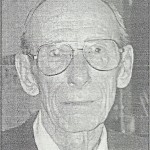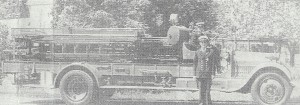By Regina Villiers. Originally published July 12, 2000 in The Suburban Life, added July 14, 2015

Cliff Berhrmann talked to the Madeira Historical Society in November about the way he remembers Madeira.

Behrmann drove an old 1924 Peter Finch ladder truck, above. The chassis was replaced in 1950 using the same body. The man standing is Floyd Nelson.
The name Clifford Behrmann is a familiar one around Madeira. Even if you’ve never met him, you’ve probably heard his name if you’ve lived here awhile.
Cliff’s fame stems from two fronts. He’s a well-remembered former fireman and fire chief of Madeira, and lately he’s becoming known as a local historian. He moved to Madeira, he says, in 1918 when he was not quite 2-years-old. So he grew up in Madeira. As he aged, so did Madeira. He remembers Madeira the way it was, an isolated little village surrounded by woods and farmland.
“Why I remember when you went north on Miami Avenue, there were no houses past Miss Nelle Hosbrook’s house,” he said. “It was just woods to Kugler Mill Road.”
Last November in a presentation to the Madeira Historical Society, he explained and described early 20th century Madeira in detail, drawing maps to show the location of streets and buildings. Most of the buildings are no longer there, especially in the Camargo and Miami Road areas. He talked about the old Brinkroger Building. The council chamber was in back of this building then, he said. He talked about the history of Meyer’s Feed Store and some of the other small stores. He especially remembers where you could buy penny candy and get three scoops of ice cream for a nickel.
The roads then were mostly dirt roads, he said. Then they brought in creek rock. Euclid and Juler started out as creek rock roads. He says tar was first put on Madeira roads when he was 4-or5-years-old. Camargo was the first concrete road and Miami was the second. This was done with mules and a slip scraper.
Behrmann has always been interested in trains. In a recent return visit to the Historical Society, he talked about the early train station and the importance of trains to Madeira.
“Madeira was a very, very busy spot on the railroad,” he said. “Madeira depended on trains, not only for transportation but to bring in their mail and the goods they used. There were scheduled freight stoppings all the time.”
All forms of transportation fascinate Behrmann. Just as he’s interested in trains, he has had a long history with planes. He loved to fly and still does.
He described a part-time job he once shared with Brownie Morgan in their youth, which involved flying.
Dave White was a Madeira stunt flyer and parachute jumper who would go out to various locations on weekends to do shows. He had had polio, and though he could fly and he could jump, he couldn’t repack his parachute and take care of it. Cliff and Brownie would go along with him to his air shows. Their job was to handle his chute and keep him safe. He would do stunt flying and make his first jump. Cliff and Brownie would repack his chute for him so that he could end the show at 5 p.m. with a spectacular jump.
Once, Cliff himself almost had to make the jumps at a show at Georgetown, Ky. Dave was ailing and didn’t think he could jump and Cliff had never jumped before. The outcome was that Dave recovered enough to do the jumps at the last minute, much to the relief of Cliff.
He flew a lot in the old days. “We flew in open cockpit planes,” he said. And he still loves to fly. Just a few weeks ago, he flew with a friend up to Portsmouth and flew around over Kentucky.
“It was fun,” he said. “I’ve had an interesting life.”
You’d probably figure that Behrmann would choose to serve in the Air Force when World War II came along. He did in the European Theater of Operations.
Cliff had a long career with the Madeira/Indian Hill Fire Department. He joined as a volunteer in 1937. In 1942, he went full-time. “I was working at the bank,” he said, “but when I got a chance to go to the fire department full-time, I took it. I never looked back.”
In the early days, the fire department was just a hose cart, pulled behind a car. “I put out a lot of fires by myself,” he said. “I’d be the only man there at times.”
In 1960, he became the fire chief and served until 1976 when he retired.
Behrmann has been invited back by the Historical Society to continue his reminiscences about Madeira. It would be worth your while to hear him. As he himself said, he has had an interesting life and he has a treasure trove of Madeira memorabilia to show. The last time, he brought old newspapers.